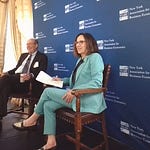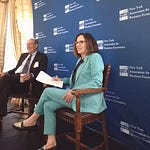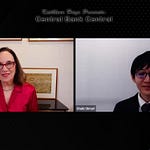Masazumi Wakatabe joined me a couple of days after the Bank of Japan made a widely expected move NOT to raise its key interest rate again. And a week after the shock election where the LDP — the Liberal Democratic Party - lost its long-held ruling majority for the first time in 15 years.
Wakatabe put on his hat as a former Bank of Japan deputy governor to explain why he sees the central bank hiking its key rate again at its December meeting. He says that as long inflation is staying on track to meet the BOJ’s official forecasts governor Ueda and the rest of the board members as will be ready to do another hike.
He agreed with the majority who say that Ueda’s decision to drop a previously used phrase that the BOJ has “ample time” to shift policy toward higher rates means it is back on track policy normalization to end its recent pause and hike its key rate again as conditions permit.
”It means I think that he’s (getting) prepared for the next hike… in December. That's, I think…the explanation,” Wakatabe adds. “I think that the dropping that phrase signals that the DOJ is now (back) on the path to the so -called normalization.”
Wakatabe put on his hat as a Professor of Economic at Waseda University and political science devotee to focus on the current uncertainty over how much Japan’s political forces have changed since the LDP lost its majority. He sees the changing political landscape where the LDP and main opposition party are aggressively vying to win over to smaller parties’ support as a new, and probably growing force that may affect how aggressive the BOJ can be on its normalization path.
So dive in and see, hear Wakatabe take a look a detailed look at who all of these parties are, what they are trying to achieve, and what it means for the pace and extent of coming rate hikes. He bring this all to life with both detail and context, and if you print out the transcript, take some notes, you will have good references to guide you as Japan’s political drama unfolds.
Masazumi Wakatabe is Professor of Economics at Waseda University, Japan, and a former deputy governor at the Bank of Japan.
Trained as a historian of economics, he has extensively written on economic thought during the past economic crises, and the Japanese economy and economic policy. He has published six books in Japanese, and has published numerous book chapters and academic articles throughout his career in both English and Japanese.
His research interests are historical relationship between economic crises and economics and central banking in theory and in practice. Visiting fellows at Cambridge University, George Mason University, and Columbia University. Vice President of the History of Economics Society (2016 to 2017), Deputy Governor of the Bank of Japan (March 2018 to March 2023). Books include The Showa Depression (2004: Nikkei Prize for Excellent Book in Economics), Economic Crises and policy Responses (2009: Ishibashi Tanzan Prize), and Japan’s Great Stagnation and Abenomics (2015).













Share this post